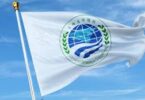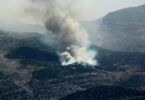Khaled Abou Zahr
The crisis in France’s Pacific territory of New Caledonia is calming down. Despite seeming like a clash between pro-independence activists and the centralized authority in Paris, as has happened in the past, this time the tone has been different and is a broader sign of France’s changing position on the global scene.
Nor can we dissociate it from the changes that are happening in Africa, where France is losing ground, or from events in French Mayotte, in the Indian Ocean, where French sovereignty is also being challenged.
All of these events resonate in similar ways, forcing France to make strategic decisions about the very meaning of sovereignty, and its capacity to operate a single, independent foreign policy and maintain control over international territories in the face of a new global balance of power.
This time the trigger for unrest in the Pacific territory was a vote in Paris on reforms that would expand the electorate in New Caledonia to include about 25,000 people who have lived on the archipelago for at least 10 years. This was a “casus belli” for supporters of independence, who say it will further marginalize the indigenous Kanak people. This leads one to wonder how a territory can offer two levels of voting rights, and why the indigenous population has historically felt marginalized?
To consider these questions we need to understand the history of New Caledonia. In 1774, British explorer James Cook became one of the first Europeans to sight it. The French established a colony there about 80 years later, and made it a penal colony in 1864. In an attempt to rehabilitate prisoners, colonial administrators offered to provide them with land there when their sentence was served.
France also sent political prisoners into exile there, including Algerian and Indochinese rebels, and 4,700 Communards (members and supporters of the short-lived 1871 Paris Commune formed in the wake of the French defeat in the Franco-Prussian War) between 1872 and 1880.
The French colonial project involved allocating land for colonists or freed prisoners to use for farming, often at the expense of the native Kanaks, who were dispossessed through measures such as the 1887 Code of Indigenat, which stripped them of their fundamental rights.
Their situation became even worse in 1897 with the creation of Kanak reserves, which restricted their movement. The expropriation of the Kanaks by the French and the deportation of convicts were interconnected events that built 19th-century New Caledonian society on a foundation of racism and discrimination.
In the post-colonial era, New Caledonia remained a part of France, unlike Algeria. But the unrest last week echoed the turbulent events in the territory during the 1980s, which began with the election of Francois Mitterrand as president in 1981. New Caledonia’s Independence Front then aligned itself with the Socialist Party, as its aspirations for autonomy grew.
In 1983, during negotiations at Nainville-les-Roches, the Independence Front asked for a referendum on self-determination for the Kanaks. A year later, dissatisfied with the new status that was proposed and the handling of land issues, the Kanak and Socialist National Liberation Front, which by then had replaced the Independence Front, boycotted territorial elections. They blocked roads and established a “Provisional Government of Kanaky,” further causing tensions to rise.
Between 1985 to 1987, the situation continued to deteriorate, with armed clashes, the declaration of a state of emergency and the formation of radical militias. In 1987, an independence referendum took place but was largely boycotted by the Kanaks, resulting in an overwhelming vote to remain within the French Republic.
The violence peaked in 1988 with the Ouvea cave crisis, in which radical independence supporters captured and held 27 gendarmes hostage. The subsequent military assault during “Operation Victor” resulted in the deaths of 19 independence fighters and two soldiers. In response to the violence, the Matignon Agreements were signed in 1988. These provided for a 10-year transitional period and a referendum on self-determination. Assassinations and unrest continued to sour the process, however, and in 1998 the Noumea Accord was signed. This recognized the ills of colonization and established a significant degree of autonomy for New Caledonia. It provided for the gradual transfer of powers, the promotion of Kanak culture, and the introduction of a specific New Caledonian citizenship. Tensions between communities persisted but efforts to promote reconciliation and economic development gradually helped to ease the situation.
Beginning in 2000, New Caledonia experienced a period of relative economic prosperity, marked by major infrastructure projects, including the construction of factories, the expansion of La Tontouta airport, and the building of facilities for the 2011 Pacific Games.
However, this period was also marked by strikes and protests over economic and social issues, including wage disputes and demonstrations about the high cost of living. The next important political development was a referendum in 2018 on independence for New Caledonia, organized within the framework of the Noumea Accord, in which 56.4 percent of voters rejected independence. A second referendum in 2020 confirmed the trend, with 53.26 percent of people voting to remain part of the French Republic.
The result of a third referendum, in 2021, was that 96 percent of people rejected independence. This reflected that fact that certain pro-independence organizations boycotted the vote. This third referendum concluded the period covered by the Noumea Accord, and marked the start of a transition phase to define a new status for the archipelago, ultimately leading to the most recent events.
It is also necessary to be aware of how important the territory’s nickel reserves are as a strategic resource for the economies of France and New Caledonia.
Indeed, New Caledonia contains 20 to 30 percent of the world’s nickel reserves and produces 8 percent of refined nickel. It therefore relies heavily on the mineral, which accounts for 90 percent of exports and one in four jobs, to drive its economy. Global nickel prices halved between 2013 and 2024 as a result of Indonesian overproduction, which has had a severe affect on New Caledonia’s economy. Swiss company Glencore withdrew from the Koniambo mine in the territory early this year, leading to its closure as it was no longer profitable.
This economic crisis has exacerbated political tensions already running high as a result of controversial constitutional reform and the fallout from the 2021 referendum on self-determination.
The problems facing the nickel-mining sector also threaten social protections, prompting calls for financial support from France. Supporters of independence view nickel as a strategic asset and want to process it locally to create greater value, through the Noumea Accord’s “nickel doctrine.” However, this strategy is struggling given the present global market conditions and high energy costs.
During his visit to New Caledonia last week, President Emmanuel Macron offered to provide financial aid, contingent on reform of this strategy, a move viewed by some as a “colonial pact” and thereby fueling further unrest.
The world is changing. Where in the past the pro-independence movement looked to Libya for protection, now it is Azerbaijan, frustrated by France’s role in its own crisis with Armenia, that is offering support.
Yet the bigger story is that France is starting to lose its grip on the international territories that confer upon the nation its strategic posture, whether in terms of maritime capacity or, in the case of French Guiana, the space sector. A profound change is taking place, as a result of which the latest unrest in New Caledonia had a different tone to previous disputes.
Macron, one must acknowledge, did travel to New Caledonia and personally faced the difficult situation there. He followed this with a historic visit to Germany, the first state visit by a French president to Berlin in 24 years.
On the first day, he and Chancellor Olaf Scholz issued a joint statement in which they said “we must strengthen European sovereignty.” This declaration is necessary for the future of Europe but nevertheless begs the question of what the future might might be for French sovereignty of its overseas territories within this wider European sovereignty.
This adds to the contradictions of the West; will France be pushed to mutualize with Europe all of its national strategic power to maintain its position in the global geopolitical game? The unrest in New Caledonia is perhaps a harbinger of deeper questions France might face, such as the future of its nuclear arsenal or its seat as a permanent member of the UN Security Council.







